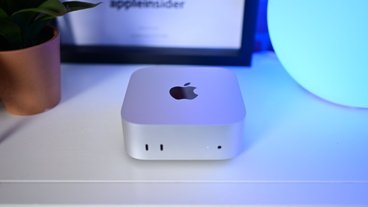Mac cloner Psystar says Apple has misused copyrights by preventing Mac OS X from being run on third-party hardware, according to an amended complaint filed yesterday.
The complaint now begins by trying to differentiate between computers that are simply capable of running Mac OS X, which Psystar calls "Mac OS Capable Computer Hardware Systems", and those computers built by Apple itself. The split is key as it sets up a competitive environment between Mac-like systems instead of Apple fighting only Windows and other non-Mac platforms.
"The most significant competitive threat to Apple is not from a new operating system," the complaint says, "but from computer hardware systems manufacturers that may offer a competing hardware platform upon which to run the Mac OS."
Thus, the Open Computer maker claims, Apple's attempt to keep those third-party manufacturers out represents anti-competitive behavior, and there is no copyright Apple holds that would permit any such attempt. According to Psystar, that behavior started around 1997, when Apple — once again led by then-interim chief executive Steve Jobs after the company's acquisition of NeXT — decided to end a clone licensing program with other vendors.
Steve Jobs discusses the end of the clone licensing program at Macworld Boston 1997. (Language may not be safe for work.)
To bolster this claim, Psystar's complaint quotes Apple senior vice president Phil Schiller at the Worldwide Developer Conference (WWDC) in 2005, when Mac OS X was introduced, essentially accusing Apple of hypocrisy for "encouraging" users to run Windows on Apple hardware, but refusing to allow Mac OS X to run on anything but a Mac.
"Schiller noted that Apple had no plans of running the Windows OS on a Macintosh but noted '[t]hat doesn't preclude someone from running it' and that Apple 'won't do anything to preclude that,'", Psystar elaborates. In contrast, Schiller talks about barring the OS from "anything other than an Apple Mac."
The clone producer accordingly maintains its earlier claim that Apple has intentionally embedded code in Mac OS X 10.5 Leopard that can initiate kernel panics or infinite loops when non-Apple hardware is detected. Such "artificial" kernel panics and infinite loops are anti-competitive because they reduce the functionality of the machine to near-zero, if it's not an Apple system, the Florida company alleges.
All of this, Psystar says, is a misuse of copyright through the End User License Agreement, which grants users permission to use Mac OS X only on Apple hardware. The cloner's argument contends that intellectual property copyrights covering the Mac OS do not cover these hardware restrictions, and Psystar insists that Apple's copyrights be found unenforceable until Apple stops misusing them through its user license agreement.
Additionally, Psystar claims Apple's allegations of violating the Digital Millennium Copyright Act (DMCA) is an attempt to "obtain, maintain, and/or enjoy rights not granted by the Copyright Act." The Open Computer designer continues to seek injunctions "as is necessary" to prohibit Apple's copyright misuse (under the license and through misapplying the DMCA) as well as any additional relief the court finds appropriate. Otherwise, the plaintiff says, Apple will prevent anyone from offering real competition that uses Mac OS X.
"Apple brought the foregoing DMCA claim in an attempt to chill innovation whereby third-parties such as Psystar would not engage in legal and legitimate development of products that compete with Apple-labeled computer hardware systems," Psystar says.
Since the Cupertino-based company has successfully eliminated any competition with its operating system, Psystar claims, Apple is free to charge "supra-competitive prices," quoting Steve Jobs' more recent October 2008 remarks that Apple doesn't "know how to make a $500 computer that's not a piece of junk" as evidence of an intent to mark systems up instead of an emphasis on quality.
Psystar's opportunities for success may be limited with its additional amendment: Judge Alsup previously threw out Psystar's anti-trust claims after Apple first filed suit last July.
The trial is scheduled for November 9th, and Apple has 20 days to respond to this latest complaint.
 Zach Spear
Zach Spear






-m.jpg)






 Charles Martin
Charles Martin

 Malcolm Owen
Malcolm Owen
 William Gallagher
William Gallagher

 Christine McKee
Christine McKee
 Wesley Hilliard
Wesley Hilliard









140 Comments
and didn't the courts already rule that Apple has the legal right to restrict the hardware that can be use with Mac OS X, when Psystar tried to claim there is a Macintosh Computer Market and Apple was being anti-trust.
as for the Windows thing, by the same token, Microsoft would have the right to restrict or not what computers use Windows. they choose not to basically allowing use on any set up, including an Apple created machine. Which is their right.
Where does Psystar get their money to fund a lawsuit against Apple because I need $$$ like that to quit work and not cause problems and just buy gadgets.
Well this part:
... quoting Steve Jobs' more recent October 2008 remarks that Apple doesn't "know how to make a $500 computer that's not a piece of junk" as evidence of an intent to mark systems up instead of an emphasis on quality.
Makes no sense whatsoever.
Steve says they don't make cheap, crap computers and this somehow means that there is no emphasis on quality? WTF?
Apple's pricing and margins are totally transparent and have been the same for years and years. This is just an incredibly foolish statement. Patently untrue, and easily provable as such.
I know there will be people here soon enough defending Psystar. But the more ridiculous crap they are spewing out in the hopes something sticks to a judge's face, the more joy I will receive the day Psystar (and their secret sugar-daddies) gets ordered to drop on their knees and get to work.
This is not an Apple issue people. This is about a company that should be allowed to own and control their product as they see fit.
I really hope Psystar gets ordered to drop their pants and bend over.
This thing going no where. They still did not demonstrate how Apple misuses a right already given to them! As far as I know, there is nothing in the Copyright Law that force you to license your property to third party. Furthermore, I thought the point of Copyright Laws was to give the owner complete control over their copyrighted material. I just hope this does not start waves of similar lawsuits against other copyrighted work.